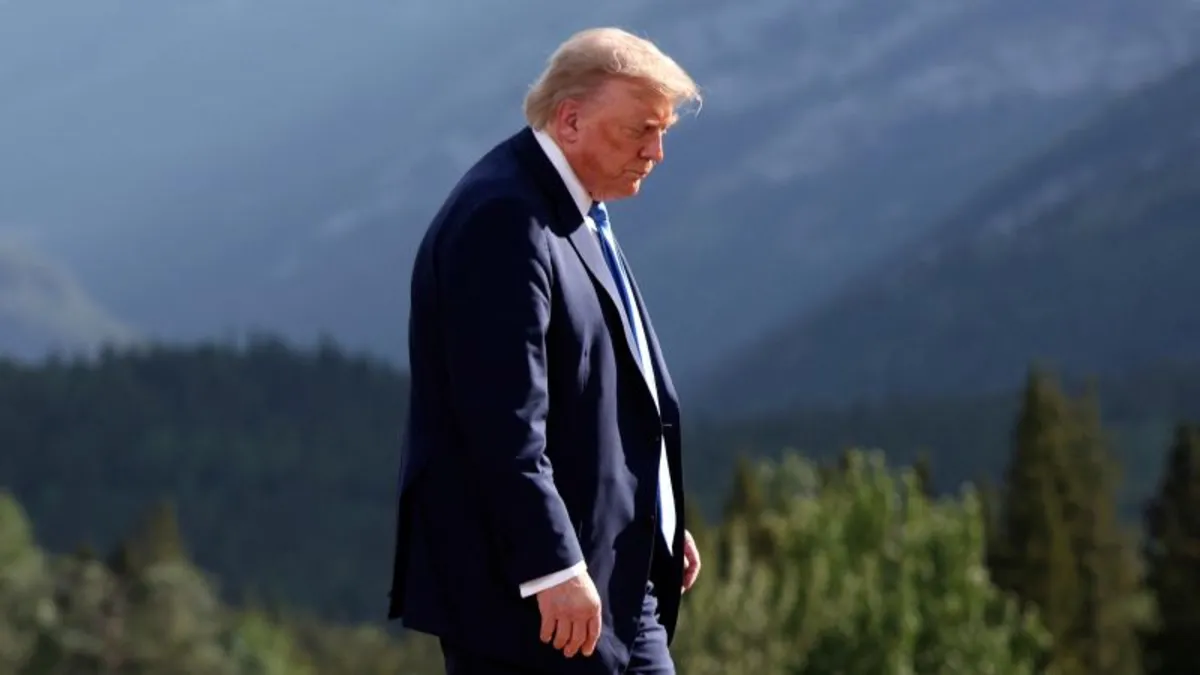
As President Donald Trump prepared to depart the G7 summit a day early, he found himself embroiled in a deepening conflict between Israel and Iran. In a critical phone call with his long-time national security advisor, Sen. Lindsey Graham, Trump received advice to take a more aggressive stance against Iran's nuclear ambitions. Graham, known for his hawkish foreign policy views, urged Trump to go "all in" to eliminate any prospects of Iran acquiring a nuclear weapon, potentially utilizing the considerable might of the U.S. military if necessary.
Following months of diplomatic discussions with Iran, Graham's warning signaled a significant shift: the window for diplomacy had closed. "Mr. President, this is a historic moment. Four presidents have promised they won’t allow Iran to obtain a nuclear weapon on your watch. You can fulfill that promise," Graham recounted. This phone call illustrates the internal conflict Trump faces within the Republican Party, where traditional conservatives, like Graham, advocate for military intervention, while some of Trump's most fervent supporters, including Rep. Marjorie Taylor Greene, caution against such actions.
Greene publicly stated that anyone advocating for U.S. intervention in Iran is not aligned with Trump’s "America First" ideology. She emphasized that a coalition of voices, including isolationist Republicans like Tucker Carlson and Steve Bannon, are pushing for non-interventionist policies. Greene expressed her concerns, stating that many Americans are against further military involvement, a sentiment she has been vocal about in recent days.
Since his conversation with Trump, Graham has been advocating for a military strike on a secretive Iranian nuclear facility. This site, located deep underground, would require a massive bomb only the U.S. possesses to be effectively neutralized. Such military action would necessitate U.S. bombers entering Iranian airspace, representing a significant escalation in the American role in the ongoing conflict.
Reports indicate that Trump is becoming increasingly receptive to Graham's approach, showing less interest in diplomatic solutions. Greene commented on the situation, noting that Trump is known for making independent decisions but should still be made aware of the concerns within his party. "Many Americans just do not want to be involved," she reiterated, highlighting the pressure on Trump from both sides of the political spectrum.
As Trump considered his next steps, a group of lawmakers, including Rep. Thomas Massie, initiated efforts to curb the President's military authority. In the past 24 hours, two War Powers Resolutions were introduced to formally restrict Trump's ability to deploy military forces without congressional approval. Sen. Tim Kaine is leading this initiative in the Senate, with Massie spearheading the House measure. While these efforts may face challenges in the Republican-controlled Congress, both measures are expected to be "privileged," which would require a vote.
Senate Minority Leader Chuck Schumer expressed confidence in the Democratic Party's readiness to assert their authority, signaling potential robust support for the resolution. The timeline for a House vote remains uncertain, as Massie has not yet indicated when he might push the measure forward. However, the actions of Trump in the coming days will likely influence lawmakers' strategies, especially regarding military action against Iranian facilities.
Should Trump order military strikes on Iranian nuclear sites, such as the Fordow Fuel Enrichment Plant, it could dramatically alter the political landscape in Washington. "If that happens, then it’s a game-changing calculation," one congressional source noted. Other Republican voices, including Sen. Josh Hawley and Sen. Rand Paul, have also expressed skepticism regarding military intervention, advocating for restraint and a focus on diplomatic negotiations instead.
As the debate intensifies, Trump's interactions with both hawkish allies and isolationist critics highlight the complexities of his foreign policy decisions. With GOP leaders like Sen. Mitch McConnell voicing concerns over the influence of isolationist factions, the coming days will be pivotal for both Trump and the Republican Party as they navigate these contentious issues.